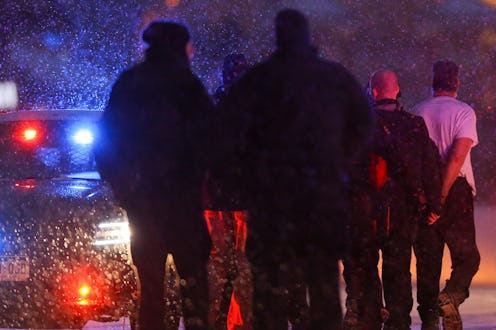News
Was The Colorado PP Attack Domestic Terrorism?
Authorities haven't released a motive for Friday's attack on a Planned Parenthood or even confirmed that the Colorado facility was the intended target—but when a gunman opens fire at a Planned Parenthood, there's a glaring theory as to why. After making it clear that shooter Robert Lewis Dear's motive is still unknown, Planned Parenthood Rocky Mountains—which is over the clinic where the shooting took place—said in a statement: "We share the concerns of many Americans that extremists are creating a poisonous environment that feeds domestic terrorism in this country." As more information about the attack is uncovered, it's important to remember that if this tragic loss of three lives was motivated by pro-life sentiments, then we need to call the Planned Parenthood shooting in Colorado Springs what it was—domestic terrorism.
"We can speculate," said Colorado Springs Mayor John Suthers of possible motives for the attack. "It happened at a Planned Parenthood center ... my suspicions are that has a lot to do with the motive." And those suspicions certainly aren't unfounded. Through the years Planned Parenthood has been the target of violence for giving women the ability to manage their reproductive health, and the organization becomes more of a political lightning bolt the longer that abortion stays at the forefront of national debate. Tensions, it's fair to say, are high.
But in the coming weeks, we'll gain some understanding of why Dear decided to open fire in the clinic on Nov. 27. And if he chose to kill three people to make a political statement, we need to be very clear about what that attack really was.
We often default to calling these attacks "mass shootings," but there's a difference between senseless killing and terror with a specific goal in mind. Terrorism is defined by Merriam-Webster as "the use of violent acts to frighten the people in an area as a way of trying to achieve a political goal." Mass shootings, meanwhile, are just that. They are carried out with no established link to the victims. Mass shooting aren't about messaging.
In a 2014, President and founder of Gun Rights Across America Eric Reed told MSNBC:
The definition of terrorism is the use of violence and intimidation in the pursuit of political aims. These shootings that have occurred obviously have used violence, that’s a given. But there is not a specific political agenda that is being pushed here, so it wouldn’t be terrorism.
But if Dear did charge the facility because he is pro-life, the Colorado shooting is the very definition of domestic terrorism. Someone who kills to signal discontent with abortion rights did not kill three random people. That person killed to make a statement — people seeking abortions or providing them do not deserve to live.
If indeed Dear was motivated by anti-abortion sentiments, we need to acknowledge that rather than chalking it up to another "mass shooting." But that won't be easy to swallow. Vilifying people from different countries unites us as Americans citizens fighting for a common cause — keeping America safe, secure and free. But identifying something as domesticterrorism is an entirely different beast. In this case, it isn't us against the world. It's us against each other.
It might sound counterintuitive, but in a strange way mass shootings — ones without clear motivation or rationale — have become more comfortable to swallow than ones created by American politics. To accept something as domestic terrorism means being aware of the derision within our own country. But understanding that these instances are a signal of a much larger problem is the only way that we will be able to have thoughtful conversation going forward.
Ignoring politically motivated killing is putting the country's head in the sand. To face it makes us uncomfortably aware that we have created a climate in which people need to take hard stances on issues that they will — quite literally — fight to the death to defend. But if we can acknowledge the existence of these type of crimes we can possibly address the need for more open dialogue and understanding.
